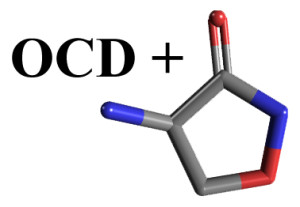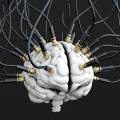OCD & D-cycloserine: A Promising Medication for OCD Treatment

"OCD, I'd like you to meet my friend, D-cycloserine. D-cycloserine, this is OCD. I think you two should get to know each other a little better. You just might have a future together..."
As someone who has long been enamored with basic science, I find it fascinating when classic medications are re-purposed in surprising ways. One of the newest examples of this is the use of D-cycloserine (also known as Seromycin) in the treatment of obsessive-compulsive disorder (OCD).
What’s interesting about D-cycloserine is not so much what it is…but what it isn’t:
- D-cycloserine is neither an SRRI nor any other type of antidepressant (e.g., Prozac).
- It’s not an anti-anxiety medication (e.g., Xanax, Klonopin).
- It’s not even an atypical antipsychotic (e.g., Abilify, Risperdal).
If it’s not one of the above, then what is it?
The answer might surprise you. Seromycin is actually an antibiotic that was originally developed to help fight off tuberculosis. What’s exciting about using an antibiotic to treat OCD is that it’s not subject to the same side effects as other medications (i.e., the SSRIs, anxiolytics, or antipsychotics). In fact, most clinical studies have found few, if any, significant side effects when using D-cycloserine in OCD treatment.
Before I go further, there’s an important caveat to keep in mind:
Research on D-cycloserine in OCD treatment is still a work-in-progress, so it’s important to maintain some healthy skepticism on this issue.
Research studies looking at using D-cycloserine to treat OCD have been fairly limited, and the results of these studies have been mixed. Some studies have suggested that the medication has small or non-significant effects, whereas other studies have found the medication to be beneficial. Several recent, placebo-controlled studies have been quite promising and have indicated that taking seromycin can initially “speed up” the therapeutic response to exposure and response prevention therapy (ERP), a form of cognitive behavioral therapy (CBT) developed to treat OCD. In essence, you benefit more from initial ERP therapy sessions. D-cycloserine doesn’t appear to have any effects on OCD when taken on its own (i.e., when not combined with exposure and response prevention). Read more about how ERP is thought to work.
It’s important to note that D-cycloserine doesn’t appear to offer any long-term benefits above and beyond what you would get from ERP alone. In the end, you’re likely to achieve the same amount of symptomatic improvement whether or not you take the medication. However, the research indicates that you’re likely to get more “bang for your buck” if you’re taking Seromycin during early exposure sessions. This is important, because it reduces early treatment frustration and drop out.
How does D-cycloserine work? Does the fact that it is an antibiotic mean that OCD is caused by bacteria?
No. Like most medications, D-cycloserine is a complicated chemical that has many different biological effects. It is not D-cycloserine’s antibiotic properties that are thought to make it useful in OCD treatment, but rather how this medication works on certain neurotransmitter receptors in the amygdala (a part of your brain that is associated with emotions like fear). Without getting too technical, D-cycloserine is thought to affect certain amygdala receptors (i.e., NMDA receptors) that are associated with learning and memory. Researchers theorize that action at these receptors facilitates learning/fear extinction, which is why the medication can apparently augment learning-based treatments like ERP. On a related note, feel free to read my short blog post on whether or not ERP works via learning or unlearning.
Can D-cycloserine be used to treat other anxiety disorders?
Yes. Research indicates that behavioral treatment of other anxiety disorders (panic, phobias, and the like) may also be enhanced by the addition of D-cycloserine. Again, overall symptom reduction may be the same whether or not the medication is used; however, the addition of seromycin may help individuals benefit more from early exposure sessions.
Final note: As a psychologist, I cannot prescribe medications; however, you’re welcome to visit my practice in Palm Beach County, Florida for exposure and response prevention (OCD) therapy. I see individuals from Palm Beach Gardens, Jupiter, and West Palm Beach, as well as the surrounding communities (including Fort Lauderdale & Miami). For more details about D-cycloserine and other medications for OCD treatment, consult with your medical doctor or psychiatrist.
You can also access some of the original research about D-cycloserine at the links below:
Some Effects Found:
- D-Cycloserine Augmented Exposure Therapy for Obsessive-Compulsive Disorder (abstract only)
- A Meta-Analysis of D-Cycloserine and the Facilitation of Fear Extinction and Exposure Therapy (full-text)
- Augmentation of Behavior Therapy With D-Cycloserine for Obsessive-Compulsive Disorder (full-text)
No Effects Found:
- D-cycloserine does not enhance exposure-response prevention therapy in obsessive-compulsive disorder (abstract only)
Questions? Comments? Sound off below.
Want Updates about New Content?
Follow Me!
Follow @drstevenseay












You fall in line to state that cycloserine’s anti-bacterial properties do not have any effect on improved mental conditions. Cycloserine is a bacteriostatic agent. This means that it messes with the DNA of bacteria in preventing them from replicating. It might surprise you to know that sixty percent of the world’s population is infected with TB or MAP. But of that sixty percent only ten percent manifest into full blown symptoms. The other fifty percent are either genetically immune or their immunes system is round the clock suppressing this virulent bug. The MAP bacteria can live in colonies all throughout the body including the brain. Crohn’s disease is now thought to be caused by MAP since there isn’t one Crohn’s patient that doesn’t test positive for it. When it starts living in the brain near the amygdala it causes social anxiety and OCD. MAP is similar to the aliens in the movie “The Body Snatchers. Its that scary.
In the context of the research cited, the effects of d-cycloserine are thought to be mediated by learning, as administration of d-cycloserine only appears to be helpful when it is combined with exposure therapy. Therapeutic effects are not shown when the drug is taken alone. This is thought to be related to d-cycloserine’s effects at NMDA receptors. Although conditions like PANDAS (or PANS) do illustrate that symptoms of OCD can be attributed to infection, this seems to be true only in a minority of cases. Time and research will tell, however…
Hi Steven, I wish to add an extremely fascinating story on an autistic child who was part of a ten child test experiment to boost the immune system with intravenous immunoglobulin. All other nine subject children had no significant effect from the treatment, however this one boy’s autism was symptomatically reversed while being treated. This means the boy’s immune system was not effectively fighting something. I wonder what it was that his immune system was fighting? Here is part of the story…
One child did have a remarkable improvement in autistic symptoms. He was 5 years 2 months old at the time of entry into the study. He was treated with 375 mgkg of intravenous immunoglobulin for a total of four infusions. The first infusion was on August 12,1989 and the final one on December 2, 1989.His clinical history was unremarkable other than the fact that he was entirely normal until he underwent an autistic regression between 16 and 18 months of age. When first seen,he was severely withdrawn with no evident social interactions, even with the parents. He was totally non-communicative, saying no words and appearing to under-stand no spoken expressions, not even his own name. He engaged in hand-flapping behaviors, was mesmerized by spinning objects such as wheels on a toy car, and refused to allow anyone to touch his face. He did not play with toys and did not engage in any imaginative activities. His immuno- logic evaluation revealed the following abnormalities:4%of all lymphocytes were CD25+ (normal, < 1.5%),the count of
CD"5+ lymphocytes was 116IFL (normal, < 30IFL), and the CD25+/CD3+percentage of lymphocytes was 4% (normal, < 1.5%).The remainder of his immunologic and general medical laboratory tests were entirely normal.
After each intravenous immunoglobulin infusion he had gradual clinical improvement that occurred in a step- wise fashion. Each improvement started to take place 7 to 10 days after an infusion and would peak after 3 weeks. Then there was a gradual deterioration, but he did not return to his previous baseline at the time of the next intravenous immunoglobulin infusion. There was gradual overall improvement to the point that after the third infusion,he was speaking words, using short sentences, and had a 20 to 30 word vocabulary. He also became much more sociable and enjoyed interactions with his parents, teachers, and siblings. The special education program in which he was enrolled reevaluated him as no longer being autistic and informed the parents that he would not be allowed to continue in that school for the following academic year. After the fourth and last infusion, clinical improvement continued. Due to a family tragedy which resulted in loss of income and loss of medical insurance, further intravenous immunoglobulin treatments could not be arranged. The clinical improvement lasted for 2 months after the last infusion, with a subsequent gradual deterioration over the following 3 months. He eventually returned to the same severe autistic condition that he presented prior to the start of the treatment program.
Brent,I realize you may not see this reply since you submitted this comment 4 years ago, but if you do see it, can you please update us on the child you referred to? I ask as Dr Susan Swedo at the National Institutes of Health and her team there might be very interested in the child you described. PANDAS or PANS is an illness that is studied by Dr Swedo and her team and she may be able to advise this family — since IVIG helped so much. I hope they might call her and ask for help, explaining their experience.
hi. I have harm ocd and soon i will go to have cbt. I live in UK. I want to know can I ask for D-cicloserine? I am 30 year old. Would it be helpful for me? Or it is only for children? Thanks.
The research in this area is a work in progress, but it seems to be helpful for both adults and children when used as part of a structured, doctor-guided intensive treatment program. However…this medication has only been found to be helpful when doing intensive treatment. To my knowledge, it has not been tested outside of a controlled treatment study and thus, it should not be self-administered in a way that has not been validated by research. Just because it may be helpful in a controlled environment does not mean that it is appropriate to use in an uncontrolled environment.
Hey Doc your obviously a very compassionate person to offer your expertise and a answer questions from everyone. I appreciate that more than I can say with words. Your entire site has been most helpful and informative. And I hope to learn more about your treatment. It is very mind quieting to learn I am not alone and everyone has scary thoughts, but we tend to wrap ourselves in them letting them controlling our lives. I have a young family and want nothing more than to be able to love them without remorse of scary thoughts. What is your take on TMS Therapy to rekindle the depressed unfuntional brain. To a normal state for full remission. After all we wouldn’t have these problems if or brains were transmitting normally. Thank you for your time